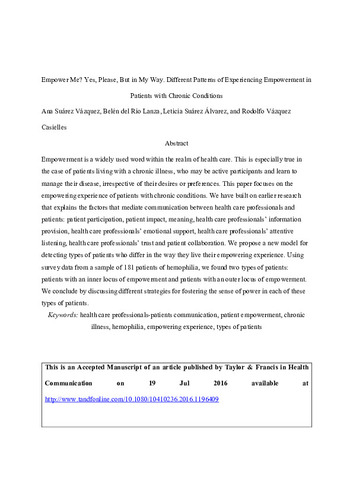Empower me? Yes, please, but in my way. Different patterns of experiencing empowerment in patients with chronic conditions
Autor(es) y otros:
Palabra(s) clave:
health care professionals-patients communication
patient empowerment
chronic illness
hemophilia
Fecha de publicación:
Editorial:
Taylor & Francis
Versión del editor:
Citación:
Descripción física:
Resumen:
Empowerment is a widely used word within the realm of health care. This is especially true in the case of patients living with a chronic illness, who may be active participants and learn to manage their disease, irrespective of their desires or preferences. This paper focuses on the empowering experience of patients with chronic conditions. We have built on earlier research that explains the factors that mediate communication between health care professionals and patients: patient participation, patient impact, meaning, health care professionals’ information provision, health care professionals’ emotional support, health care professionals’ attentive listening, health care professionals’ trust and patient collaboration. We propose a new model for detecting types of patients who differ in the way they live their empowering experience. Using survey data from a sample of 181 patients of hemophilia, we found two types of patients: patients with an inner locus of empowerment and patients with an outer locus of empowerment. We conclude by discussing different strategies for fostering the sense of power in each of these types of patients.
Empowerment is a widely used word within the realm of health care. This is especially true in the case of patients living with a chronic illness, who may be active participants and learn to manage their disease, irrespective of their desires or preferences. This paper focuses on the empowering experience of patients with chronic conditions. We have built on earlier research that explains the factors that mediate communication between health care professionals and patients: patient participation, patient impact, meaning, health care professionals’ information provision, health care professionals’ emotional support, health care professionals’ attentive listening, health care professionals’ trust and patient collaboration. We propose a new model for detecting types of patients who differ in the way they live their empowering experience. Using survey data from a sample of 181 patients of hemophilia, we found two types of patients: patients with an inner locus of empowerment and patients with an outer locus of empowerment. We conclude by discussing different strategies for fostering the sense of power in each of these types of patients.
Patrocinado por:
This work was funded by the Spanish Ministry of Science and Innovation under the 2011–2015 Call for R&D projects (ECO2012-31300). The authors thank the Spanish Federation of Hemophilia and Spanish Society of Haemostasis and Thrombosis for their collaboration in the collection of data, and student Lucía Huergo for her participation in the creation of online Web Financial support from the Cátedra Extraordinaria Fundación Ramón Areces de Distribución Comercial is gratefully acknowledged.
Colecciones
- Administración de Empresas [514]
- Artículos [37541]
- Investigaciones y Documentos OpenAIRE [8415]
Ficheros en el ítem





